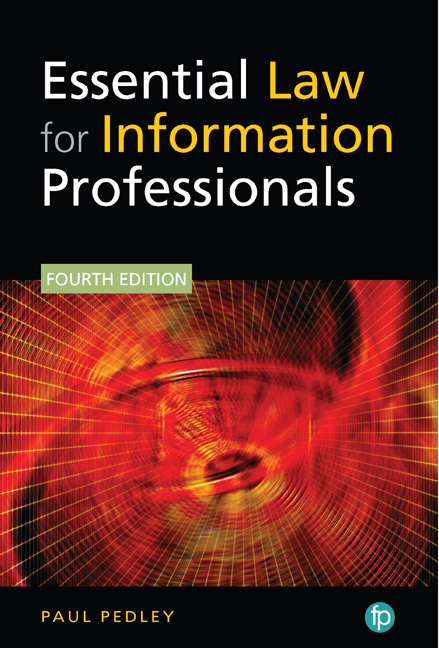Book contents
- Frontmatter
- Dedication
- Contents
- Disclaimer
- List of Figures and Tables
- Table of Statutes, Etc.
- Table of Cases
- Abbreviations
- Glossary of Terms
- Preface
- Chapter 1 General law and background
- Chapter 2 Library Law
- Chapter 3 Copyright
- Chapter 4 Legal Deposit
- Chapter 5 Breach of Confidence
- Chapter 6 Contracts and Licensing Agreements
- Chapter 7 Data Protection
- Chapter 8 Privacy
- Chapter 9 Freedom of Information
- Chapter 10 Human Rights
- Chapter 11 Re-use of Public Sector Information
- Chapter 12 Defamation
- Chapter 13 Professional Liability
- Chapter 14 Cybersecurity and Cybercrime
- Chapter 15 Disability Discrimination
- Chapter 16 Other Legal Issues Relevant to Librarians
- References
- Appendix 1 Brexit and the Orphan Works Exception
- Appendix 2 CILIP'S Ethical Framework
- Index
Chapter 11 - Re-use of Public Sector Information
Published online by Cambridge University Press: 27 March 2020
- Frontmatter
- Dedication
- Contents
- Disclaimer
- List of Figures and Tables
- Table of Statutes, Etc.
- Table of Cases
- Abbreviations
- Glossary of Terms
- Preface
- Chapter 1 General law and background
- Chapter 2 Library Law
- Chapter 3 Copyright
- Chapter 4 Legal Deposit
- Chapter 5 Breach of Confidence
- Chapter 6 Contracts and Licensing Agreements
- Chapter 7 Data Protection
- Chapter 8 Privacy
- Chapter 9 Freedom of Information
- Chapter 10 Human Rights
- Chapter 11 Re-use of Public Sector Information
- Chapter 12 Defamation
- Chapter 13 Professional Liability
- Chapter 14 Cybersecurity and Cybercrime
- Chapter 15 Disability Discrimination
- Chapter 16 Other Legal Issues Relevant to Librarians
- References
- Appendix 1 Brexit and the Orphan Works Exception
- Appendix 2 CILIP'S Ethical Framework
- Index
Summary
Background
In a study produced by PIRA (2000), it was estimated that the size of the European information industry was EUR 68 billion whereas by contrast the figure was EUR 750 billion for the USA. The European Commission and others attributed this to the fact that in America federal government information is not subject to copyright and that therefore most federal government information can be re-used with virtually no restrictions. The European Commission judged that there was enormous scope for growth in this area, especially in terms of developing pan-European products and services.
Recognising the value that public sector information (PSI) can contribute to the economy, the Commission passed a Directive in 2003 (2003/98/EC) on the re-use of public sector information and this was implemented in the UK through The Re-Use of Public Sector Information Regulations 2005: SI 2005/1515.
Article 13 of the 2003 Directive committed the Commission to carrying out a review of the application of the Directive before 1 July 2008. The review led the European Commission to conclude that there was further scope to promote a more open and proactive approach to the re-use of public sector information. Indeed, they considered that Europe's public administrations were sitting on a goldmine of unrealised economic potential. The Commission therefore launched an open data strategy for Europe, which was anticipated to deliver a EUR 40 billion boost to the EU's economy each year.
The total direct economic value of PSI is expected to increase from a baseline of EUR 52 billion in 2018 for the member states to EUR 194 billion in 2030 (https://ec.europa.eu/digital-single-market/en/proposal-revision-public-sectorinformation-psi-directive).
In June 2013, the European Commission passed Directive 2013/37/EU which amended the earlier Directive (2003/98/EC) and this was implemented in the UK in July 2015 through the Re-Use of Public Sector Information Regulations 2015: SI 2015/1415. The RPSI regulations of 2015 brought public sector libraries, museums and archives within the remit of the re-use legislation for the first time.
General principles
The UK government recognises the importance of public sector information and its social and economic value beyond the purpose for which it was originally created.
- Type
- Chapter
- Information
- Essential Law for Information Professionals , pp. 233 - 246Publisher: FacetPrint publication year: 2019



